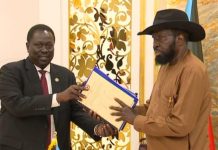Africa-Press – South-Sudan. South Sudan’s finance and planning minister Dier Tong Ngor on Tuesday tabled the 2023-2024 fiscal budget – which amounts to SSP2.1 trillion – before the country’s transitional parliament.
Speaking during the presentation of the budget on Tuesday, Dier who was last the governor of central bank, said this year’s budget increased salaries of the civil servants and members of organized forces by at least 400 percent.
“The revenue collected in the first three quarters was SSP 1 trillion. This is due to a rise in the crude oil price and an improvement in tax administration by the National Revenue Authority,” he told lawmakers this afternoon.
The senior government official said the budget has a deficit of SSP 267 billion which will be financed through borrowing and other sources.
He disclosed that financial contributions from oil revenue to this year’s budget amounted to SSP 1.5 trillion, while non-oil revenue accounted for SSP 245 billion and SSP 56 billion from grants.
He revealed that the budget mainly aims to tackle the implementation of the 2018 peace deal, prioritized salary increments and social spending as well as the development of infrastructure.
“The key macroeconomic objective of the Fiscal Year 2023/2024 budget is that the Real GDP growth will be 3.9 percent compared to 1.5 percent growth in the Fiscal year 2022/2023,” he said.
“The inflation will be 10.4 percent on average, the exchange rate of the South Sudanese Pound against the United States dollar will stabilize at around 917, and oil price will average USD80.7 per barrel.”
He added that SSP 455 trillion will cover wages and salaries, and SSP 222.8 billion will be used for the purchase of goods and services.
He said peace implementation accounts for SSP 50 billion and SSP 37.9 billion for contingency with SSP 47.8 billion to Constituency Development Funds.
In addition, SSP 32.5 billion has been allocated for salary arrears for foreign missions and SSP 41.6 billion for administrative areas.
“With respect to borrowing, the Ministry of Finance and Planning shall solicit money from credible lenders to finance the fiscal gap,” he said.
Meanwhile, tariffs and fees to Sudan account for 173.1 billion, and SSP 30.7 billion is allocated to oil-producing states and administrative areas.
The communities of oil-producing states were allocated SSP 46 billion while SSP 46 to be transferred to the Ministry of Petroleum and the National Revenue Authority retains SSP 24.5 billion.
For More News And Analysis About South-Sudan Follow Africa-Press






